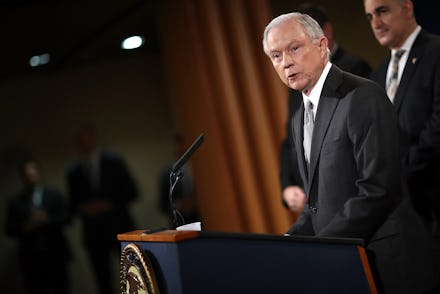Will GOP criminal justice reformers push back on Trump's "tough on crime" agenda?

For the past few years criminal justice reform has been held up as the model for bipartisan policy making in Washington, D.C. But now the Trump administration looks poised to undo all the recent progress that has been made on the issue in one fell swoop, and reform-minded conservatives are suddenly nowhere to be found.
On Thursday Attorney General Jeff Sessions released a memo ordering prosecutors in the Justice Department to seek maximum penalties for drug crimes. The order completely reverses the previous administration's attempts to reduce aggressive sentencing for non-violent drug crimes. It also flies in the face of one of the biggest bipartisan policy initiatives of the past decade.
Throughout the latter half of former President Barack Obama's presidency, Republicans and Democrats in the Senate repeatedly flirted with the prospect of passing sweeping criminal justice reforms, including some efforts targeted directly at sentencing for non-violent drug crimes.
In 2016, a bipartisan group of 36 senators co-sponsored a bill that would have reduced mandatory minimums for certain repeat drug offenses. Despite the Trump administration's "tough on crime" rhetoric, top Republican senators had been planning a new push to pass the legislation as recently as January.
Now, with Sessions' latest move, that piece of legislation looks more like a thing of the past, and few of the bill's Republican co-sponsors are coming forward to address the matter.
Mic reached out to all 16 Republican co-sponsors of the legislation for comment on the Justice Department's new policy. As of this writing, only Sen. Rand Paul (R-Ky.), whose libertarian leanings have long made him an opponent of mandatory minimums, was willing to directly critique the Sessions memo.
"Mandatory minimum sentences have unfairly and disproportionately incarcerated too many minorities for too long," Paul said in a statement. "Attorney General Sessions' new policy will accentuate that injustice. Instead, we should treat our nation's drug epidemic as a health crisis and less as a 'lock 'em up and throw away the key' problem."
Sen. Mike Lee's (R-Utah) office responded to an inquiry by pointing to a tweet the Senator had sent that morning. The tweet, which makes no mention of the Justice Department's policy, links to a 2015 speech Lee made on "the conservative case for criminal justice reform."
None of the other 14 senators responded to a request for comment.
Even conservative outside groups, which have not been afraid to critique the Trump administration in the past, offered tepid responses to the new policy.
Representatives of the billionaire Koch brothers' network of conservative political groups — organizations which have long supported criminal justice reform — reportedly told BuzzFeed's Tarini Parti. "We favor a different approach which requires changing some of the existing federal laws."
That response is considerably measured for a representative of organizations that have not been afraid to criticize the Trump administration on other issues. For instance, during the Trump administration's first attempt to pass the American Health Care Act, organizations in the Koch network started a six figure fund to support any Republican lawmaker who opposed the bill because it wasn't conservative enough.
Meanwhile, the bill's co-sponsors on the other side of the aisle offered full-throated denouncements of Sessions' memo.
"This policy shift flies in the face of the growing bipartisan consensus that we need to reduce — not increase — the length of prison sentences for nonviolent drug offenders," Democratic Minority Whip Dick Durbin (D-Ill.), one of the bill's authors, said in a emailed statement.
"This will not make us safer — quite the opposite, it will strip critical public safety resources away from targeting truly violent criminals in order to house nonviolent drug offenders," Sen. Pat Leahy (D-Vt.) said.
Sen. Cory Booker (D-N.J.), a leading voice on criminal justice reform issued an even starker look at what Sessions' latest memo could mean for the country.
"Piling on mandatory minimum sentences and 'three strikes, you're out' laws on nonviolent offenders did little to stop the illegal drug trade in recent decades," Booker said in a statement. "Instead, it decimated entire communities, most often poor communities and communities of color; resulted in an uneven application of the law; and undermined public trust in the justice system."
The relative silence of one-time conservative reformers may be motivated by fear of retribution from a president with a reputation for attacking members of his party who disagree with him. It may also be out of concern for the possibility that the conservative base supports Trump's hardline "law and order" agenda. But whatever the cause, one thing is clear — the chances of a new bipartisan push for criminal justice reform just got a lot more dim.